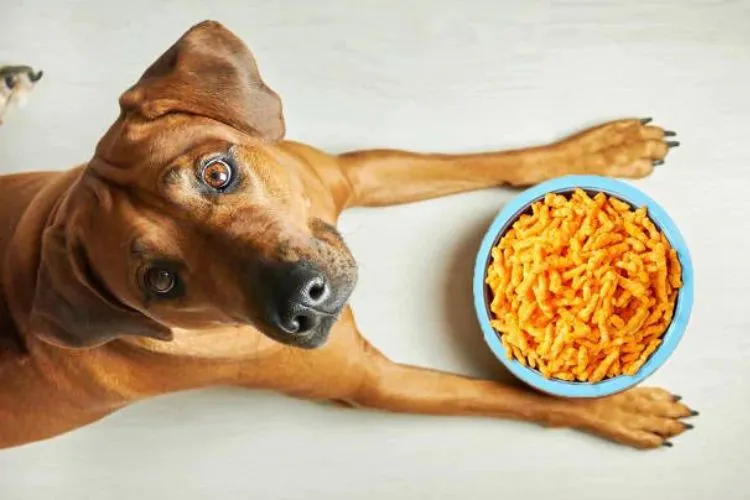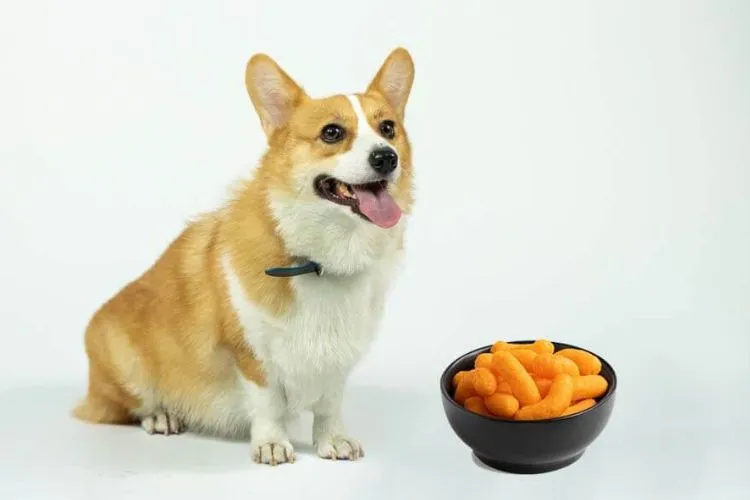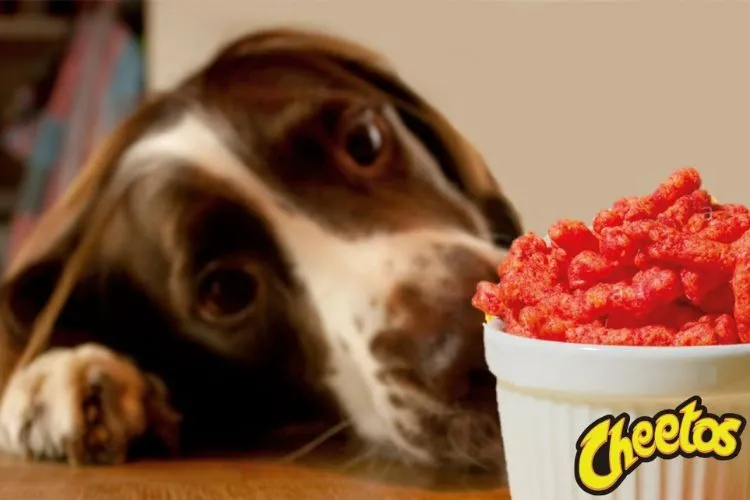For many of us, snacking on Hot Cheetos is a guilty pleasure. These fiery, cheesy treats are hard to resist, and as loving pet owners, it’s tempting to share our favorite snacks with our furry companions.
So, can dogs eat hot Cheetos?
Well, before you toss a Cheeto to your dog, it’s crucial to understand whether these spicy indulgences are safe for canine consumption.
This article delves into the world of dogs and Hot Cheetos, offering evidence-based wisdom to keep your beloved pet happy and healthy.

🐾 Understanding Hot Cheetos: Ingredients and Concerns
Hot Cheetos, while delectable to many people, contain a mixture of ingredients that are simply not designed for a dog’s digestive system.
From the ground corn base to various seasonings, including salt, cheese, and the notorious spice mix that gives these snacks their signature kick, these components can be problematic for dogs.
Corn is not inherently toxic to dogs, but it’s also not the most nutritious foundation for their diet. The additional seasonings bring much bigger concerns.
High levels of sodium can lead to salt toxicity, and artificial flavorings and colorings may trigger allergic reactions. Of particular concern is the fiery spice itself, which can irritate a dog’s gastrointestinal tract.
🐾 Can Dogs Eat Hot Cheetos? The Health Risks of Hot Cheetos for Dogs
When you imagine a dog eating Hot Cheetos, immediate enjoyment might come to mind – that instantaneous tail wagging and eager munching.
However, the aftermath presents a different story. Here’s why Hot Cheetos could cause your dog more harm than joy:

Gastrointestinal Issues: The fiery spices can cause stomach upset, diarrhea, or vomiting in dogs. These symptoms can range from mild to severe, depending on the amount consumed and the dog’s sensitivity.
Potential for Pancreatitis: Dogs with a history of pancreatitis should be kept away from fatty foods, which includes Hot Cheetos. The high fat content can trigger a painful and potentially life-threatening inflammation of the pancreas.
Risks of High Sodium and Fat Content: Besides potential pancreatitis, the unnaturally high sodium levels can lead to excessive thirst, urination, and even sodium ion poisoning in extreme cases. Symptoms include vomiting, diarrhea, decreased appetite, lethargy, incoordination, and possible seizures.
Choking Hazards and Allergies: The shape and consistency of Hot Cheetos could also present a choking hazard, especially for smaller dogs. Moreover, if a dog has unidentified allergies, Hot Cheetos could contain triggers leading to an allergic reaction.
🐾 What If Your Dog Ingests Hot Cheetos?
If your dog snatches a Hot Cheeto or two when you’re not looking, don’t panic. The consequences will vary based on the size of your dog and how much they’ve eaten.
If it’s just a small piece, monitor them for any signs of distress. If ingested in larger amounts, it’s best to play it safe and consult your vet. Here’s a guideline for potential signs of trouble that may require veterinary attention:
- Persistent diarrhea or vomiting.
- Increased thirst with frequent urination.
- Signs of pain, such as whining or reluctance to move.
- Swelling in the abdomen accompanied by pacing or restlessness.
In such cases, immediate veterinary care is crucial. The vet can provide supportive care with fluids and medications to relieve symptoms.
🐾 Safer Snack Alternatives for Dogs
Thankfully, there are plenty of dog-friendly snacks that are healthier and much safer than Hot Cheetos.
When choosing a snack, opt for those that are made specifically for dogs since they are formulated to be easily digestible and nutritionally beneficial. Consider snacks like:
- Dog-specific treats that are low in fat and calories.
- Fresh vegetables such as carrots or green beans, which can be a crunchy, healthy alternative.
- Plain, cooked meats like turkey or chicken without any added spices or seasonings.
Always introduce new foods to your dog’s diet slowly and in moderation to monitor how they react before making it a regular treat.
🐾 Expert Opinions
Veterinarians consistently warn against feeding dogs human snacks, especially those that are spicy or high in fat and salt.
Although the occasional slip-up might not result in disaster, it’s best to stick to a diet that aligns with your pet’s nutritional needs, as advised by professionals. Incorporating foods high in fats or seasonings can lead to health issues in both the short and long term.

Dogs have different dietary requirements and what might be a harmless snack for us can spell trouble for them.
For instance, Hot Cheetos’ combination of high-fat content, spices, seasonings, and preservatives may not affect a human’s well-being significantly, but for a dog, it can be extremely harmful.
🐾 Frequently Asked Questions (FAQs)
A single Hot Cheeto is unlikely to be lethal for a dog. However, it could cause minimal to severe discomfort depending on the dog’s size, health, and how sensitive they are to the snack’s ingredients.
There is no safe number of Hot Cheetos for dogs. It’s advisable not to feed any to your dog to avoid any health risk altogether.
Look for signs of gastrointestinal distress, including vomiting, diarrhea, decreased appetite, and lethargy. Also, be alert for signs of excessive thirst and urination, which could indicate sodium toxicity. If any of these symptoms occur, contact your vet immediately.
Conclusion:
Hot Cheetos and dogs don’t mix. Most veterinary experts would agree that it’s best to keep Hot Cheetos and similar snacks away from your canine friend.
The high fat, sodium, and spice content pose several health hazards, from mild digestive upset to severe complications like pancreatitis. Be vigilant with your snacks and ensure they’re out of reach of curious muzzles.
As a final note to responsible dog owners, always remember that prevention is better than cure. Keeping your pets safe from potentially harmful foods is a fundamental component of conscientious pet ownership.
